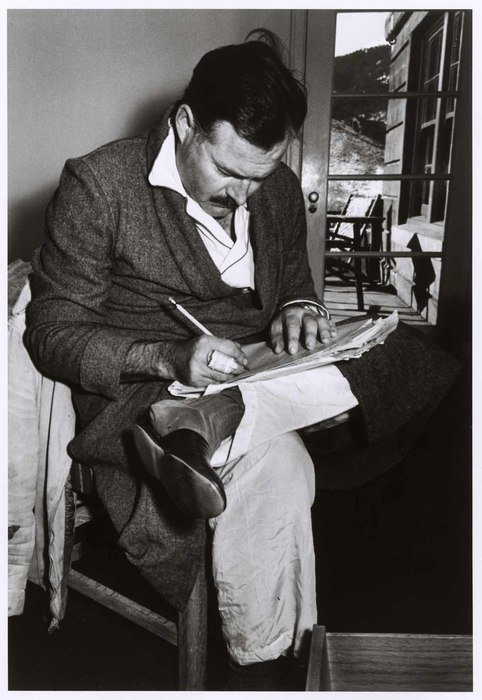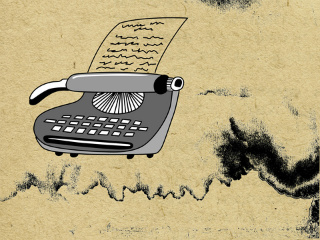What are you wearing? Sounds like something you’d hear on a cheesy erotic movie, right? Well, when you work from home, as most writers do, you need to think about that.

Are you the sort of writer who likes to get comfortable before you sit down to work? Maybe you don’t even change out of your PJ’s in the morning. Or maybe you change into them before you work in bed. Pajamas are the ultimate in comfort-wear: loose-fitting and soft, just begging you to relax and focus on your manuscript. My PJ’s are an old “Answers.com” t-shirt and a pair of baggy shorts. I usually don’t wear them to write in, though. When I try to write in bed, I get too comfy and end up dozing off…

Or maybe you’re the sort of writer who enjoys dressing up to get to work. Perhaps you need the reminder that this is a job and you should dress the part, as if you’re headed for the office. A no-nonsense business suit will make sure you don’t dilly-dally around and forget the ultimate goal: to finish that novel.
There are even writers who really get into the spirit of things and dress as their characters. I could easily do that. I have a lovely cowboy hat after all, and a period shirt and vest (although I have yet to find a pair of trousers that I really like). Maybe you enjoy a Victorian era ball gown or a morning suit. Or maybe you write science fiction and your outfit is a bit more out of the ordinary…

But you wanted to know what I wear to write. I’m afraid I fall somewhere in the middle. I generally do get out of bed and get dressed, although I don’t dress up. My preferred writing outfit is a comfy t-shirt and a pair of jeans. I usually do put on shoes, too, because I have a bad ankle that needs the support even if I’m just walking to the kitchen for a snack. My t-shirt usually has some sort of logo or sarcastic saying on it, usually fitting my mood for the day.
What about you? What are you wearing?
I’ve been writing stories since I could write (which was before I started school). The earliest work I remember (that my parents saved anyhow) was a horrid poem entitled “Silly Mouse.” It didn’t even rhyme. However, as I matured, my writing (I like to think) improved.

When we were in grade school, my sister and I found a nifty new game in one of those Scholastic-type school magazines. It was called “Plot Luck” and the goal was to write a crazy story as you moved your token along the pathway to the finish line. It provided word prompts at various points, which you had to incorporate into your story. My sister and I used to compete to see who could come up with the silliest story, then see if our parents would laugh at it. We cut the pages out of the magazine and mounted the game on a piece of cardboard so it would last longer. We played for hours at a time, exercising our imaginations and creating tale after tale. I wish I still had that old game, just for nostalgia purposes, but it fell apart long ago.
When I was in middle and high school, I kept up my reading and writing, even getting a short poem published in the local newspaper for a contest. Unfortunately, I was convinced by well-meaning adults that writers didn’t make a good living and encouraged to make a career in the other area in which I excelled: science. I have to say that the paychecks have been satisfactory, but there are times I wonder what my career would have been like if I’d taken the leap and tried to become a full-time writer back in the beginning (or maybe took the writing more seriously and tried harder to get published).

It wasn’t until the mid-90s that I began seriously sending out short stories to magazines and getting paid for my work. I even got a couple of stories compiled into two “Best Of” anthologies, which was heartening. Then I found out about NaNoWriMo, where you sign up to write 50,000 words in 30 days. My best friend dared me to do it, and I dug out an old fan-fiction piece I’d done, changed the names and a bit of the scenario, and had a go at it. I ended up with a finished novel. It’s been through a few revisions, but it’s ready to be published if I can just find a publisher who doesn’t think “caper” stories are dead. Like I said, I should have started publishing sooner, like back when those were more popular.
I now have three historical novels written, along with a (now out-of-print) anthology of short stories that sold tolerably well. One of my alter-egos has five e-books at a small press and the other alter-ego is editing our first science-fiction novel. I’ve published several of my short stories in magazines and anthologies. I’m hoping to attract the attention of a sci-fi agent at sometime soon. And, as with Disney, it all started with a mouse.
I didn’t actually get to “attend” this virtual event in person, as the sessions were mostly while I was at work, but I’m rewatching the highlights on the website and enjoying them.

My favorite sessions so far have been “Take Off Your Pants” (a session urging you to outline at least the main points of your plot) and “Up The Ante” (about adding conflict to your story). Of course, the Jane Friedman session about self-publishing is also quite informative.
Some of the tips we’ve learned so far include the “beats” of your story:
- Opening Scene: we see the character in their ordinary life
- Inciting Event: this changes their entire life with no way back
- Character Realizes External Goal: they know what they want
- Display of Flaw: we see the character’s main flaw that has prevented them from gaining that goal before
- Drive for Goal: character makes an effort to reach their goal
- Antagonist Revealed
- Thwart #1: the antagonist (or something else) gets in the way of the goal
- Revisiting Flaw: we see the flaw keeping the character from the goal
- New Drive for Goal: the character tries even harder
- Antagonist Attacks
- Thwart #2: Another obstacle in the way
- Changed Goal: the character finds a new goal
- Ally Attacks: a friend/mentor points out flaws/challenges character
- Girding the Loins: the character finally recognizes their flaws
- Battle: the character fights the antagonist
- Death: the dark moment where everything looks hopeless
- Outcome: end of the story/wrap-up
And for Conflict. we learned the following:
- Central Conflict: the main engine driving the story; the central question of the book; the major challenge the protagonist must overcome by the end of the story
- Underlying (Chronic) Conflict: an outside conflict thrust onto the character
- Internal Conflict: thoughts/emotions
- Transient Conflict: circumstantial (Act of God)
A scene must either advance the plot or reveal something about the character. You need some sort of conflict in each scene, also, either explicit or internal. Ask yourself, “What’s the worst that could happen here?” — and then make it happen.
I am submitting the opening of Outlaw Security to the Jericho Writers “Friday Night Live” contest. You send in the first 500 words without your name on the page and the judges decide on the top three entries. Wish me luck!
My alter ego is working on some science fiction tales for a couple of new anthologies so wish us both luck!
I also need to decide whether or not I should revamp Outlaw Security and cut the word count in half. That would probably require making two separate books out of it, which I’m not sure would work. Maybe I should just write some 45K stories about the lads and try to sell the original novel as is.
I’ve been asked to name an author who influenced me. This is such a hard question because I read so much and have so many “favorite” authors!

I have to say that Tony Hillerman would be one of them, though. I’ve read and loved all of his books, especially the Navajo Tribal Police series. His depictions of the different Native American cultures is always spot-on and he can make you feel as if you’re really out there in the American Southwest.
I can never manage to write a mystery, though I love reading them. I tend to skimp on red herrings and forget about wrapping up the clues properly. Hillerman, however, was a master of the subplot and a genius at distributing clues along the way to the ending. I never quite managed to figure out “whodunnit” before he revealed the culprit.
And I loved the way he depicted the Native Americans in his stories: just ordinary folks living their lives as best they could, trying to be the best human they could be–like all of us. They’re not stereotypical “Injuns,” but normal people you feel you could sit down and share a cup of coffee or a glass of beer with. Hillerman didn’t gloss over the problems of life on “the rez,” but he didn’t dwell them either. After all, we have plenty of poverty-stricken or drug-addicted whites barely hanging on or living on the streets. We’re all just human, after all.
I hope I learned a few things from Tony Hillerman: how to make your characters real people, how to sprinkle clues along the plot line of your tale, and how to make the setting just another character. I know one thing: I still enjoy rereading my battered paperback copies of his stories.
How does a writer keep their muse healthy?

One of the things I like to do as I write is listen to music. I turn it on low and let my favorite songs play in the background. Right now, I’m hooked on U2-X-Radio on SiriusXM. They play U2 songs, of course, but also songs that the band members like and songs that inspired them, so it’s an eclectic mix. I also listen to movies and TV shows if I’ve seen them enough so they don’t distract me from the story I’m working on. Movies like Lord of the Rings and old John Wayne Westerns are good for that–I’ve seen them so many times that I can let them be background noise instead of paying close attention to the show.
Another inspiration is reading, of course. I try to keep up with some of the newer stories in my chosen genres, although I don’t always enjoy the dystopian stuff that seems to have become so popular nowadays. I do enjoy a good Western novel (I even like the odd “mail order bride” tale upon occasion) and am partial to mysteries even if I cannot write them effectively. Scifi and historical fiction are harder to keep up with. There aren’t a lot of novels which sound interesting to me (that dystopian thing) but I do make the attempt. I’m not a huge fan of overly political stories either–the ones where the characters have to fight conspiracies or “the old order” to succeed. I’d much rather read a good coming-of-age story or something about aliens surviving on their own planets.
I’m hoping the country is ready for some lighter-hearted stories again after all this dystopian political negativity. I, for one, have had enough realism in my novels and would like to see some humor again. And I can only hope I’m not the only one, because that’s what I tend to write.
What about you? What do you find that inspires you to write? How do you keep your muse healthy?
I’ve been “attending” the SC Writer’s Association’s virtual conference this weekend. The keynote speaker was Patti Callihan Henry, who spoke about “The Soul of Story” and said we are hard-wired for the art of storytelling. We also had a writing workshop with her where we looked at telling a story based on your character’s wants. She asked us to think about the following questions:
- What does your character want?
- Why does your character want it?
- What is the misbelief or unconscious belief that keeps your character from getting it?
- What will your character learn or who will they become?

We also had a sessions on finding humor in tense situations and a panel of literary agents explaining exactly what it is that they do. Patti and her agent, Amanda Bostic, talked about how a manuscript goes from draft to marketplace. The afternoon workshop was on putting emotion into your writing, then we had a query-fest and a prompt party before the open mike night. I read the opening pages of Outlaw Security and it went over pretty well, so I’m happy.
Today, we’re going to start with “The Shy Writer’s Guide to Presenting Yourself” and “A User’s Guide to Novel Structure.” We’ll end the conference with a slush-fest. I didn’t send anything in to that because I already know Outlaw Security starts off strong. I just need to throw in a little tweak I thought up the other day …
It’s been a good conference and a nice weekend. I’ve enjoyed “talking” with my fellow writers and hearing their work.
What are some of the obstacles writers – especially new ones – face? Here are the Top 10 in my opinion.
- Self-Confidence: The Number 1 obstacle, I believe, is yourself. It’s hard to believe in yourself when you’re getting rejection after rejection, but hang in there. Revise and edit, revise some more, and eventually you’ll succeed.
- Refusal to Edit: Ego can be just as bad as low self-esteem, however. When you feel your work cannot be improved, you’re fooling yourself.
- Lack of Support: Find yourself a network of other writers, whether in real life or online, and get the support everybody needs. Your friends and family aren’t likely to understand or sympathize with your problems.
- Lack of Time: Of course, this can be corrected. You usually don’t “find” the time to write. You make the time.
- Poor Query Letter: Your query letter must be the most highly-polished piece of writing you’ve done, or it’s not likely to attract an agent or editor.
- Poor Cover Letter: Ditto the cover letter. Check not just for spelling and grammar, but for a polished blurb and enticing “hook.”
- Lack of Skill: Writing is an art, but it’s also a science that can be learned. Read, read, read, and read some more so you know how it’s done.
- Lack of Conflict: Your manuscript (or story) must be one obstacle after another thrown at your POV character or it’s not going to be interesting enough to keep the reader’s interest.
- Lack of Plot: Many writers have a great idea, but no real plot or story. Make sure you’ve got both before you dig in and get started.
- Poor Idea: Other writers don’t even have a good idea. They just have a series of scenes playing in their head. Make sure your idea is a good one before you start plotting.
Of course, you may have your own “Top 10” list. What do you feel are the biggest obstacles a writer faces?
People always ask writers “What’s your writing routine like?” Especially if they are budding authors themselves. With this in mind, I will remind you that everyone has their own style and their own nature–what works for one person won’t work for everyone.

But back to my own routine. I try to get up at least 30 minutes before I have to leave for work every day. I use this time to post on my social media and check up on my email. I post on Facebook and Twitter every day. and I also have a Patreon site I update on weekdays.
Depending on when I get home, I may put in an hour or two of writing in the evening (unless I’ve got chores that need doing). What I write depends on what’s up in my roulette wheel. I’m currently trying to revamp the historical fiction novels as novellas, churn out some short stories and try to sell them to a variety of anthologies, edit the sci-fi novel into shape, come up with some romance plots for a ghost writer (it’s for peanuts, but every little bit helps, right?), and whip up some copy for a blog (also paying customer). I do more writing on the weekends, which I have off. Another writing-related chore is participating in my writing critique groups. I’m a member of my state writing association and the local chapter meets twice a month to discuss our stories. I’m also a member of the League of Utah Writers (their online-only chapter), which “meets” twice a month as well. We just exchange chapters and critique one another. I also have a state-related sci-fi chapter that meets once a month and the occasional critique piece from my original group (Transworld Writer’s WorkShop…we’re currently suffering from a lack of energy).
Once I get the novels whipped into shape, I’m going to start querying agents again (and a publisher for the historical fiction). That will add another chore to my routine, but it won’t be a daily occurrence. I’ll have to keep track of who I’ve queried and what their replies have been, which requires an Excel spreadsheet. My short stories are tracked by The Submission Grinder website, which also provides searches for new markets, and I periodically check that site and update the standing of each story.
As I said in the beginning, what works for me might not work at all for you. You might prefer to stay up later at night rather than getting up early. You may like to do your writing in a big lump on your days off. Whatever works for you, stick with it and keep writing!
I try to write every day. How do I accomplish this, you may ask?

I get up about an hour early every morning so I can do my social media and blogging for one thing. This gives me time to get everything done without rushing and I feel I’ve accomplished something before my day officially begins. I post on Facebook daily, and on Twitter. I update my Patreon and if it’s time, I work on one or more of my three blogs.
After I get home, I also try to fit in a little fiction work. OK, I usually eat dinner first. But after that, I’ll turn on something mindless to listen to, like an old Western movie or TV show I’ve seen before (so I won’t be distracted by it). Then it’s off to my real job–writing. I like to try to fit at least a page or two in before it’s time to chat with my pal in Iowa (we message each other every evening for around an hour). If I’ve just finished writing something, I may edit rather than create, but it’s all part of writing.
I write more on the weekends (if I’m not trying to clean the house). I usually try to fit in a few hours’ of work Saturdays and Sundays. That gives me some good solid word counts to work with. So that’s my writing schedule in a nutshell. If you’re willing to get up early (or stay up late), you can put in the work, too. Don’t just wait for “the muse” to strike–if you don’t have a writing schedule of some kind, you’re not going to get much done in the long run.